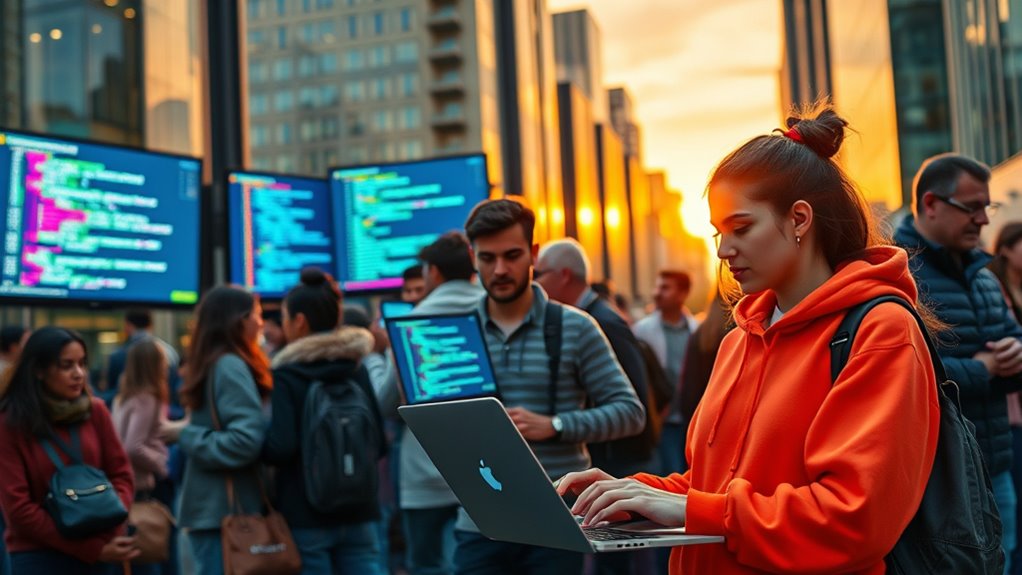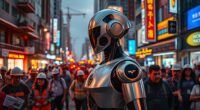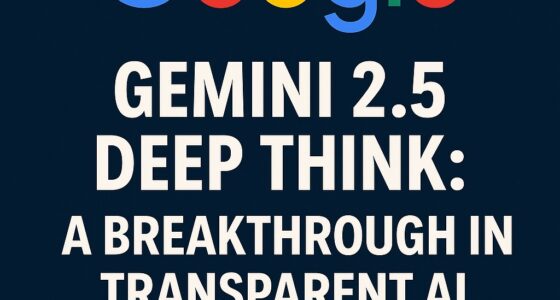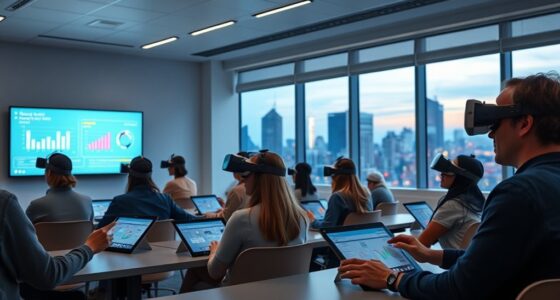In the age of AI, learning to code remains valuable, as it boosts your ability to adapt, innovate, and collaborate on complex projects. While AI automates routine tasks, human oversight, creativity, and strategic thinking are still essential. Acquiring coding skills broadens your career options across industries and prepares you for emerging roles managing AI systems. If you’re curious about how coding can help you thrive alongside AI, keep exploring the evolving tech landscape.
Key Takeaways
- Automation reduces routine coding but increases demand for skills in AI, system design, and ethical oversight.
- Coding remains essential for innovation, customization, and managing AI-driven technologies across industries.
- Learning to code enhances adaptability, career flexibility, and competitiveness in a rapidly evolving job market.
- Human creativity and judgment are crucial; coding knowledge helps oversee AI, debug, and address ethical issues.
- Continuous learning in coding equips individuals for new roles in AI, machine learning, cybersecurity, and data management.
The Evolving Role of Developers in the AI Era

As AI becomes more integrated into software development, your role as a developer is shifting from writing every line of code to focusing on higher-level tasks like system design and strategic planning. AI automates repetitive coding tasks and generates code snippets, increasing your productivity—sometimes by over 200%. While nearly 30% of developers worry about job security, AI also opens new opportunities, allowing you to take on strategic roles in system orchestration. Your responsibilities now include collaborating with AI tools, refining generated code, and ensuring quality. You need to develop skills in AI, machine learning, and natural language processing to stay relevant. This evolution means you’re moving toward a more strategic, oversight-driven position, where understanding AI’s capabilities is essential for shaping future software solutions. Additionally, the rapid advancement of AI tools means developers must continually update their skillsets to keep pace with emerging technologies. Developing a deep understanding of software tuning techniques can help you optimize AI-generated code for better performance and reliability, and staying informed about natural language processing advancements will be critical for effective collaboration with AI systems. Moreover, gaining AI literacy is becoming increasingly important for developers to effectively leverage new tools and maintain a competitive edge. Furthermore, understanding the impact of AI on employment can help developers navigate the changing landscape and capitalize on new roles.
Why Coding Remains a Critical Skill Across Industries

Coding continues to be the backbone of innovation and technological progress across industries. It underpins the development of emerging tech like AI, IoT, and quantum computing, requiring skilled programmers to create and refine these systems. AI itself is built through coding, making human expertise essential for guiding its growth. Coding allows industries to customize and integrate AI tools effectively, transforming outputs into practical applications. Additionally, coding drives innovation in finance, healthcare, and manufacturing, fueling industry growth. The importance of understanding projector technology can also be relevant in fields like entertainment and visualization.
How AI Is Transforming Coding Careers and Responsibilities

AI is reshaping coding careers by automating routine tasks and enhancing developer productivity. Today, AI generates 41% of all code globally, writing 256 billion lines in 2024 alone. AI-driven tools can automate testing, debugging, and documentation, freeing you to focus on complex problem-solving and system design. However, human oversight remains essential for refining AI-generated code and ensuring quality. As a developer, your responsibilities are shifting toward overseeing AI tools, integrating their output into larger systems, and managing ethical considerations like bias mitigation. This evolution means you’ll need continuous learning to stay current with AI advancements. While automation handles simpler tasks, your role becomes more strategic, emphasizing creativity, architecture, and security—areas where human expertise is irreplaceable. Significant portion of the global workforce at risk of automation highlights the urgency for developers to adapt and expand their skill sets to remain relevant in an AI-driven landscape.
The Symbiosis Between Human Creativity and Machine Intelligence
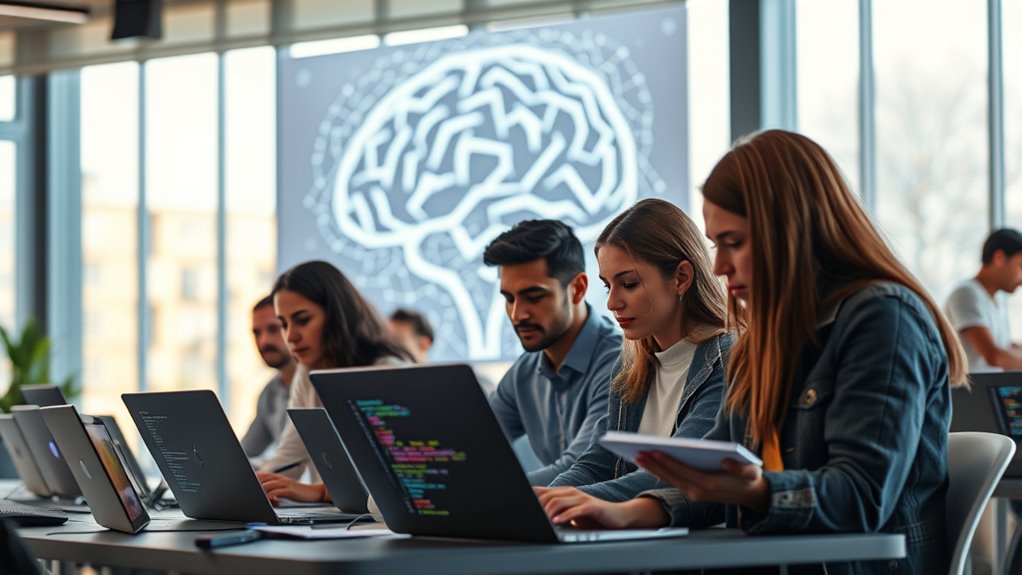
You can leverage AI to boost your creative problem-solving by combining your ideas with machine-generated insights. This collaboration opens new avenues for innovation, where human intuition and AI’s pattern recognition work hand in hand. Together, you’ll find solutions and create content that pushes boundaries beyond what either could achieve alone. Generative AI challenges the traditional view of creativity as exclusively human, demonstrating that machine assistance can enhance and expand our creative capabilities. Recognizing machine learning as a tool rather than a replacement encourages a more collaborative approach to problem-solving and innovation, emphasizing the importance of mind-body connection in developing holistic solutions. Additionally, fostering active listening and empathy in human-AI interactions can improve the quality of collaborative outputs, ensuring that technology complements human skills effectively. Incorporating camping resources and guides can serve as a metaphor for preparing thoroughly and adapting to new environments when integrating AI into creative workflows, helping individuals navigate potential challenges and embrace new opportunities.
Creative Problem-Solving Synergies
When human creativity combines with machine intelligence, problem-solving becomes more dynamic and innovative. AI handles large datasets, quickly identifying patterns and trends that might escape you, while recognizing complex data patterns enhances your decision-making. Your intuition and creative insights bring fresh perspectives that AI alone can’t generate. This synergy allows you to synthesize diverse ideas, leading to novel solutions. In creative industries, AI can produce art or assist in design, but your emotional depth and aesthetic judgment remain essential. This collaboration streamlines workflows, automates routine tasks, and provides real-time insights, enabling you to focus on higher-level problem-solving. Additionally, the adaptive learning capabilities of AI foster continuous improvement in educational contexts, making learning more effective and personalized. The technology is improving at a fast pace, enhancing its effectiveness and scope, which further amplifies the potential of human-AI collaboration. Understanding asset division strategies can be crucial in legal and financial contexts, demonstrating the importance of combining human expertise with AI tools. Leveraging data analysis techniques allows for more accurate predictions and strategic planning. Moreover, integrating sleep and meditation techniques can optimize cognitive function, creativity, and decision-making, further expanding the potential of this collaboration. Developing emotional intelligence skills can help you better interpret AI outputs and collaborate more effectively with machines. Together, human ingenuity and machine intelligence create a powerful duo that expands the boundaries of what’s possible.
Enhancing Innovation Through Collaboration
The collaboration between human creativity and machine intelligence opens up new levels of innovation by leveraging their complementary strengths. You bring creativity, intuition, emotional insight, and abstract thinking to problem-solving, while AI offers rapid data processing, pattern recognition, and precise execution of repetitive tasks. By combining your insights with AI’s analytical power, you can develop more innovative solutions and make better-informed decisions. AI can quickly generate alternatives or scenarios from large datasets, helping you refine creative ideas. Meanwhile, your judgment guarantees ethical considerations and contextual understanding where AI lacks nuance. This synergy accelerates workflows, boosts productivity, and expands creative possibilities—such as generating novel content or uncovering hidden trends—ultimately transforming how you innovate and solve problems. Understanding the power of data-driven insights further enhances this collaboration, enabling more targeted and impactful innovations. Recognizing the importance of remote work can also facilitate more flexible and collaborative environments that foster innovation and creativity. Additionally, embracing interdisciplinary approaches can lead to breakthroughs by integrating diverse perspectives and expertise. Moreover, understanding legal guidelines related to emerging technologies ensures responsible implementation and sustainable development.
Essential Skills for Excelling in AI-Driven Projects

Excelling in AI-driven projects requires a solid foundation of technical skills that enable effective development, deployment, and optimization of AI systems. You need to be proficient in core programming languages like Python, R, or Java, with Python being especially valuable due to its rich AI libraries such as TensorFlow and PyTorch. Understanding algorithms, including neural networks and decision trees, helps you select and fine-tune models for real-world problems. Strong knowledge of mathematics, like linear algebra and calculus, underpins your grasp of algorithms. Data handling skills—including cleaning, feature engineering, and visualization—are essential for meaningful insights. Finally, domain expertise and soft skills like problem-solving and communication ensure your AI solutions are relevant and effectively implemented. Developing an understanding of inspirational quotes about fatherhood can also foster leadership and mentorship qualities that are valuable in collaborative AI projects.
The Personal and Professional Benefits of Learning to Code

Learning to code opens a wide range of personal and professional advantages that can greatly shape your career and daily life. It expands your career options, with software development jobs projected to grow 17% from 2023 to 2033, outpacing most fields. Coding skills *access* opportunities across industries like healthcare, finance, and entertainment, especially in cybersecurity, AI, and cloud computing. You gain a competitive edge by combining coding with domain expertise, making it easier to *shift* or upskill into tech-driven roles. Professionally, coding boosts your earning potential—average salaries for developers are over $105,000, with higher pay in specialized areas. On a personal level, coding fosters creativity, enabling you to build digital products, automate tasks, and express ideas innovatively.
Addressing Common Concerns About Coding in a World of AI
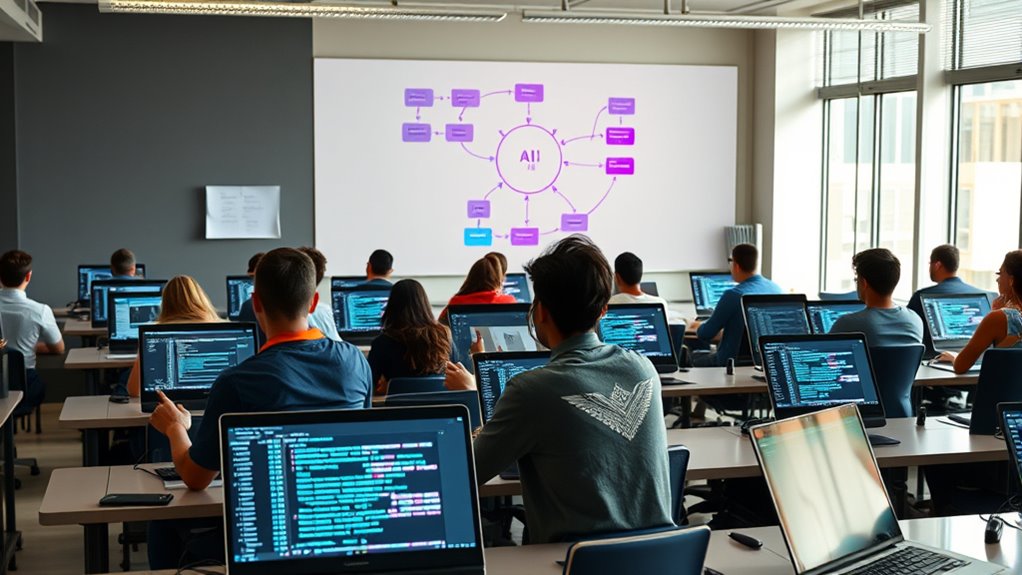
Many worry that AI automation will threaten jobs, but it often shifts roles rather than eliminates them. Accessibility can also seem like a barrier, yet AI tools are making coding more inclusive and easier to learn. By understanding these concerns, you can see how coding remains essential in an AI-driven world.
Automation vs. Job Loss
As AI automates more tasks, it’s natural to worry about losing jobs, but the reality is more nuanced. Currently, only about 14% of workers have experienced displacement due to AI, and the actual impact remains less severe than many fear. In May 2023, AI caused just 5% of all U.S. job losses, ranking seventh among causes. While sectors like tech and manufacturing face layoffs, AI also creates new roles requiring critical thinking, creativity, and problem-solving. Many displaced workers had higher expectations of job loss than what actually occurred. Plus, AI’s growth is expected to generate more jobs than it displaces, especially in healthcare and education. Overall, AI’s influence on employment balances disruption with opportunity.
- AI displaces a small percentage of jobs currently
- Job losses are often concentrated in specific sectors
- New roles emphasize advanced skills and creativity
- AI-driven growth can lead to more jobs than losses
- Perceptions of job loss may overestimate reality
Accessibility for All
While AI has the potential to revolutionize digital accessibility, concerns about coding complexity and implementation challenges often create barriers for developers and organizations alike. Many websites, including 96.8% of home pages, still have WCAG 2 failures, like low contrast and missing alt text. Only about 30% of WCAG issues can be detected automatically, and improper ARIA implementation can introduce more errors. Despite these hurdles, improving accessibility benefits everyone by promoting digital inclusion and offering a competitive edge—85% of organizations see it that way. However, 90% of websites remain inaccessible to assistive technologies. AI tools can help bridge these gaps by automating checks and suggesting fixes, making accessible design more achievable for all, even amid complex coding standards.
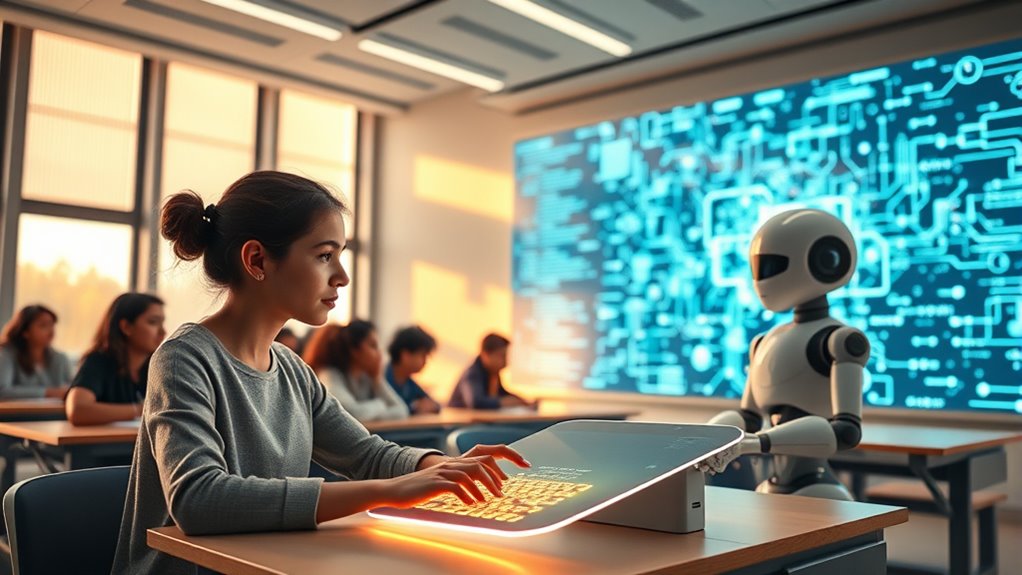
The rapid rise of AI and automation is transforming the job market, prompting many to question whether everyone still needs to learn coding. While demand for software developers is projected to grow 21% from 2018 to 2028, the nature of the roles is shifting. Specialized skills in AI, cloud computing, and cybersecurity are increasingly valuable, and routine coding tasks are being automated. You’ll find that:
AI and automation are shifting coding roles, emphasizing specialization in AI, cloud, and cybersecurity.
- Developer numbers are rising, but growth favors niche expertise
- Automation reduces some programming jobs, but creates roles managing AI systems
- Coding remains a foundation, especially for tech-adjacent careers
- Market competitiveness for entry-level roles intensifies
- Continuous learning and adaptability are essential in a rapidly changing landscape
Ultimately, coding knowledge is still relevant, but its necessity varies by role and specialization.
Frequently Asked Questions
Can Non-Technical Professionals Benefit From Learning to Code?
You can definitely benefit from learning to code as a non-technical professional. It helps you automate repetitive tasks, improve efficiency, and handle data better. Coding boosts your problem-solving skills, making you more resourceful and adaptable. Plus, it opens up new career opportunities, increases your job security, and enhances collaboration with technical teams. Overall, coding empowers you to work smarter, communicate more effectively, and stay competitive in a digital world.
How Quickly Can Someone Become Proficient in Coding for AI Projects?
Did you know it takes about 1.2 to 2 months to bridge the skill gap for complex AI projects? You can become proficient in coding for AI within a year if you follow a structured learning path. Focus on mastering math, Python, and core algorithms first, then gradually move into deep learning and real-world applications. With dedication and the right resources, you’ll gain the skills needed to contribute effectively to AI projects quickly.
What Are the Most Accessible Programming Languages for Beginners Today?
You’ll find Python, HTML/CSS, JavaScript, and PHP the most accessible programming languages for beginners today. Python’s syntax is intuitive, making it easy to learn and versatile for many projects. HTML and CSS allow you to create and style web pages quickly. JavaScript adds interactivity to websites with a forgiving syntax, while PHP helps you understand server-side development. These languages have strong communities and plenty of learning resources to get you started.
Will Low-Code or No-Code Tools Replace Traditional Coding Skills?
You might wonder if low-code or no-code tools will replace traditional coding skills. Notably, about 70% of new applications are expected to use these platforms by 2025. While they speed up development and involve non-technical users, they won’t fully replace coding. Instead, you’ll need to learn both to handle complex projects, customize solutions, and stay competitive. These tools complement, not replace, traditional programming skills.
How Does Learning to Code Impact Creativity in Problem-Solving?
Learning to code boosts your creativity in problem-solving by encouraging experimentation and exploration. It helps you visualize abstract ideas and develop multiple approaches to challenges. As you code, you gain confidence through tangible results, fostering innovative thinking. Coding pushes you to think flexibly and adapt strategies, making you better at tackling complex problems creatively. Overall, it enhances your ability to think outside the box and find novel solutions.
Conclusion
As AI continues to reshape industries, it’s worth noting that a recent survey shows 70% of employers value coding skills even more now. While you don’t need to become a software engineer, learning to code boosts your problem-solving and adaptability in this tech-driven world. Embracing coding today helps you stay relevant, creative, and prepared for future opportunities. So, yes—you should consider learning to code, even in the age of AI.
